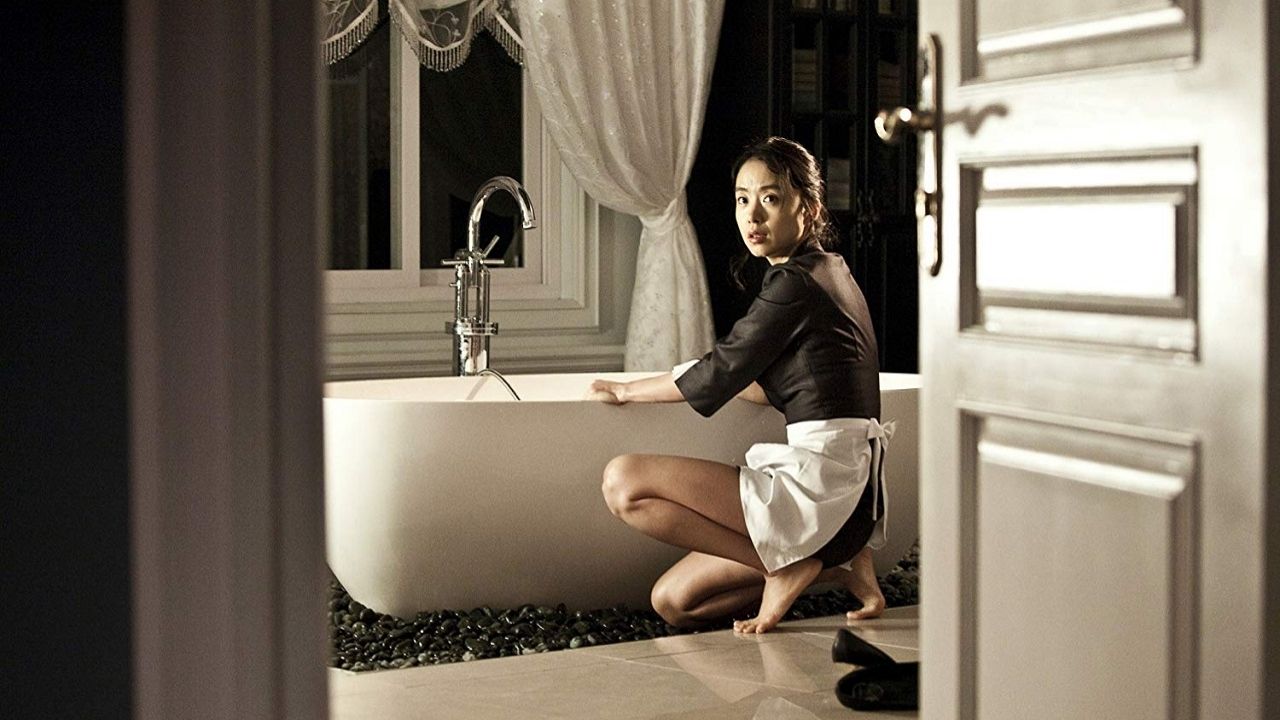
Im Sang-soo's remake of one of the most beloved and influential South Korean movies of all time, Kim Ki-young's The Housemaid, is pretty much universally shit on by fans of the original. I mean, the guy took the movie that was the slow-burning blueprint for insanity in South Korean cinema and turned it into a slick icicle of a film with an almost entirely different plot and bad CGI. I don't like either film, but I thought it'd be worthwhile to salvage one of the worst things I have written to talk about some of the more interesting differences between both films.
The 1960's Housemaid is a rough little psychosexual thriller with a tongue-in-cheek twist that pulls the rug out from beneath your feet in the last few seconds. I'm sure you can tell how much it's influenced South Korean cinema by that description alone. Its plot is somehow really complicated yet also boring at the same time, and while the one-dimensional nature of its characters suddenly makes a whole lot of sense once that ending PSA starts rolling, it's still not very engaging in any way other than the abstract.
The newer Housemaid is a jaded, suffocatingly formalist response to the passionate original. Sang-soo essentially removed every defining element of the original Housemaid besides "poor maid has sex with rich boss" and made what is by all accounts a generic thriller with whatever came to mind. Not to sound like one of those film writers who think every aspect of their analysis of a film was intentionally there by design, but it's kind of cool to see how this monumental "important" movie was entirely turned back in on itself, cannibalized by its own inspirational elements.
Now, if we think of modern South Korean cinema as a tree where the root is the 1960s Housemaid and the branches are the works of directors like Park Chan-wook and Bong Joon-ho*, it's clear that the branches have gotten slicker and slicker as time has passed. 2010's The Housemaid is no exception, just as controlled as any modern Korean blockbuster, but the dull look and feel has a purpose - none other than good-old class criticism!
While many SK dramas are completely overwrought with emotion (shoutout to Park Chan-wook), The Housemaid is emotionally unavailable to a point. There is not one ounce of energy or emotion in this supposed "dramatic" film, not even during the driving moment of infidelity. But this lack of emotion makes a lot of sense to me, especially because we spend so much of the film blinded by how smooth and colorless everything is. Sex is treated as an important means to an end here -- there is no emotion attached to it because for the rich family at the center of this movie, there is no emotion attached to anything. The bizarre cheating scene happens more due to a logical flowchart than anything related to real human emotion: man has wife ➔ man can't have sex with wife ➔ man realizes he CAN have sex with that cute, ever-present submissive maid around the corner ➔ sex commences. It may not be as fiery and wild as its source material, but the utter lack of emotion and obsession with appearances of most of the protagonists sure is a fitting take on the modern new-money parasites that have replaced the well-to-do hard-working Joneses of the original.
I can't write a single piece without talking specifically about how films treat women, so here it is: the original Housemaid’s end is seriously brilliant -- acknowledging its Boogeyman treatment of a sexually aggressive, "crazy" woman in need twists the film into a wry satire far removed from the dramatic cautionary tale the film masquerades as. Unfortunately, while this has made me appreciate it a lot more, this didn't make the film any more interesting as I was watching it.
Like some of the best Korean thrillers, the new Housemaid makes quick work of male characters and devotes most of its usually-captivating runtime to the unique emotions and actions of women. But unfortunately, it's not anywhere near as smart as the original in this regard. Where the original was shockingly self-aware about the stereotypes its characters fell into, Sang-soo doesn't even bother to make his "scorned women" nor his depiction of them stray from the norm. Instead, most of the nuance comes from the character Nami -- a young girl born into a hollow, posturing life that she seems all too aware of. In probably the saving grace of the movie's incredibly dumb blunt ending, her enigmatic gaze makes us wonder if she is doomed to be just like her parents -- another emotionally debased member of the bourgeoisie.
Do I think either of these films are great? Not really. But I don't think we should automatically judge remakes by how faithful they are to their source material, and I definitely don't think a movie being "important" means it's exempt from criticism. Remakes can be great and remakes can be shitty, but for this certain title, they're neither.